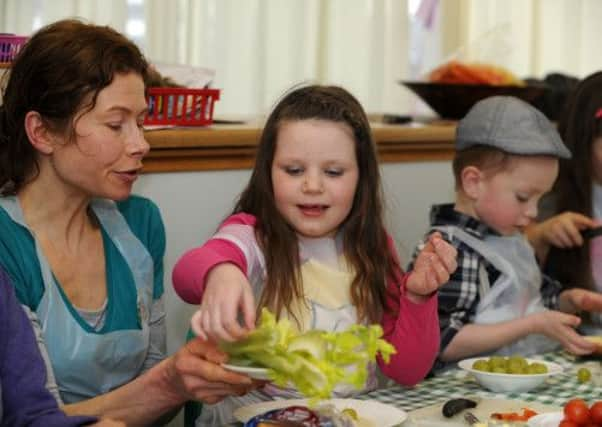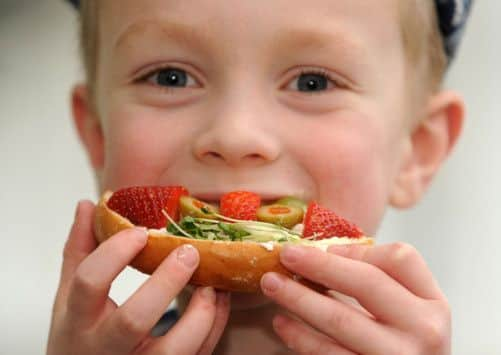An early start for a change of course on eating


When it comes to horror stories of children’s eating habits, Sorrell Fearnell could fill a book. Possibly an entire series.
There’s the children who are so hungry they go through school bins to find breakfast. There’s the mother was so worried her son would turn his nose up at school dinners, she sent him off each morning with the only thing she knew he was guaranteed to eat - a pack of chocolate buscuits. And not forgetting the youngster who asked to record what he had for breakfast, lunch and tea, wrote down sausage roll for all three.
Advertisement
Hide AdAdvertisement
Hide AdIt’s been nine years since Sorrell returned from Ireland where she was working as a chef to her native Yorkshire and it was a chance conversation with a friend which led to her starting a social enterprise which has taken her to Westminster and seen her blueprint for healthy eating rolled out to 1,500 schools and counting.


“I’d been away for a few years and when I came back it really struck me just how eating habits had changed,” says Sorrell, who now lives in Harrogate. “I grew up in Beverley on a farm so we were always very aware where food came from and like and my mum always made a point of us all sitting down to eat as a family.
“Somewhere along the line that changed. Not long after I got back to England I was talking to a friend who was struggling with her weight and so was her child. It was very clear that these issues are passed down and I just thought that maybe I could help.”
While Sorrell had trained as a chef she knew she needed expert help to turn her vision into a reality and put out an appeal online for a qualified nutritionist. It was answered by Dr Jennie Cockroft, who it turned out lived just a five minute drive away.
Advertisement
Hide AdAdvertisement
Hide AdTogether they drew up plans for PhunkyFoods, a teaching resource for schools, which crucially targets children from reception class onwards.
“There’s no point trying to change habits when children get beyond the age of 10,” says Sorrell. “It’s too late. You need to catch them young and you need to accept that obesity no longer discriminates. People used to think of it as a problem confined to deprived areas. It’s not, there are plenty of middleclass parents whose children are overweight.”
Certainly the millions spent by successive governments seems to have made little difference. According to figures released last summer the number of obese children is still on the up. In Sheffield the number of overweight 10 to 11-year-olds has gone up by more than a third, while Leeds showed a 12 per cent rise and Rotherham, where parents were a few years ago parents were passing fish and chips through the school gates in protest at Jamie Oliver’s attempts at school dinners also saw an increase. Only York, where PhunkyFoods operates in 130 schools, provided any reason for optimism with a 3.8 per cent drop.
Sorrell and her team are currently carrying out their own research to assess the lasting impacts of their own programm, but admits that achieving any kind of consistency when school curriculums change at the whim of each new Education Secretary is not easy.
Advertisement
Hide AdAdvertisement
Hide Ad“Since Jamie Oliver we’v ehad the the Schools Food Trust which did a lot of really good work. Then cam the Children’s Food Trust and now we are onto the School Food Plan. Those behind the latter seem to be saying the right things, but that’s not quite the same as actually getting things done. “
The most recent criticism of the nation’s eating habits came from the Academy of Medical Royal Colleges in a report which basically concluded that if the public can’t be trusted to eat well they will have to pay for eating badly.
The Academy is now demanding an experimental 20 per cent increase in the cost of sugary drinks lasting a year, fewer fast food outlets near schools and an expansion of bariatic surgery for those already passed the point of no return.
While Sorrell found much food for thought in the research document, she is not convinced that top down legislation is where the solution lies.
Advertisement
Hide AdAdvertisement
Hide Ad“What we need to change is cultural and social attitudes to food and exercise,” she says. “It has to be about education. I know some people find it hard to believe that there are children who don’t know that having fizzy drinks with every meal isn’t good for them and can’t identify even basic vegetables, but there are.
“I never wanted this programme to be about blacklisting certain foods, but it is about given children a realistic picture of nutrition. We want them to know what’s healthy, what they should eat in moderation so that as they get older they can make their own informed decisions.
“The problem is that if you have grown up on a diet of fastfood then the idea of eating anything else, anything cooked by yourself is alien .”
The loss of domestic science classes in schools has had an impact. While teaching a class of 30 how to make apple crumble was often fraught it did mean that they left school knowing at least a few basic recipes.
Advertisement
Hide AdAdvertisement
Hide AdHowever, as anyone involved in the issue of obesity knows, it’s impossible to lay the blame at any one door. Yes, dropping home economics has had an effect, but so has the ease of convenience foods, the rise of the computer game generation and the long-hours culture.
Whatever the reason when to look at any school playground or the crowds walking down any British high street, the evidence as to why we are now known as the fat man of Europe is there to see.
One in four adults is currently obese and the firsgures are predicted to rise to 60 per cent of men, 50 per cent of women and 25 per cent of children by 2050. With obesity estimating to cost the NHS £5.1bn a year there have been suggestions that the food industry pick up a greater share of the bill.
PhunkyFoods has already secured the support of food giants like Nestle and McCain and their finanical backing means that in a large number of cases they can offer the resources to schools for free.
Advertisement
Hide AdAdvertisement
Hide AdThose that don’t qualify, pay a one-off fee of £495 which covers training, access to 400 lesson plans and teaching resources. Always on message, Sorrell says it works out less than the cost of a packet of crisps per child.
“I feel like we have created a system that not only works, but crucially which is affordable for schools which have a billion other demands on their resources,” says Sorrell. “A lot of efforts to reduce obesity levels while well meaning have not shown any real results.
“I am really excited to know the results of our own research, but I know it’s working. We lost a whole generation of people who not only knew what was good for them, but knew how to cook healthily. We are now starting to turn back that tide.
“We didn’t become an obese nation overnight and it will take time, but we are getting there, we are definitely getting there.”
Advertisement
Hide AdAdvertisement
Hide AdYou are what you eat – how a lesson in healthy food should be child’s play
Sat around the table are three princesses, one pirate and Batman. It’s World Book Day at Carr Infant School in York, but it’s also time for the next instalment in the PhunkyFoods programme.
Under the guidance of teaching assistant Beverley Phillips the children are making teddy bear toast. There’s only four ingredients - a slice of bread, banana, raisins and low fat spread, but Batman registers his concern early on. He doesn’t like bananas.
“Don’t worry, remember what we say, ‘have a sniff, have a lick and if you still don’t like it, put it in the bin’.” The banana goes in the bin, but at least Batman has tried and that’s’ the point of many of the sessions.
Advertisement
Hide AdAdvertisement
Hide AdIt’s about opening children’s eyes to food in the hope they may in turn influence their parents. “I have seen children who every day go to school with ketchup sandwiches in their pack-up,” says PhunkyFoods dietician Michelle Hanchard. “They eat it because they don’t know any different.”
An hour later the school’s cookery club is underway. Today’s lesson is in healthy bagels, wraps and sandwiches. The combination of cream cheese, strawberry and carrots and grapes might be eclectic, but it goes down well. Last week they tried bruschetta.
“It was so good that my dad asked what shop we’d bought it from,” says one. It’s the kind of small victory which PhunkyFoods believes could change appetites for the better and for good.